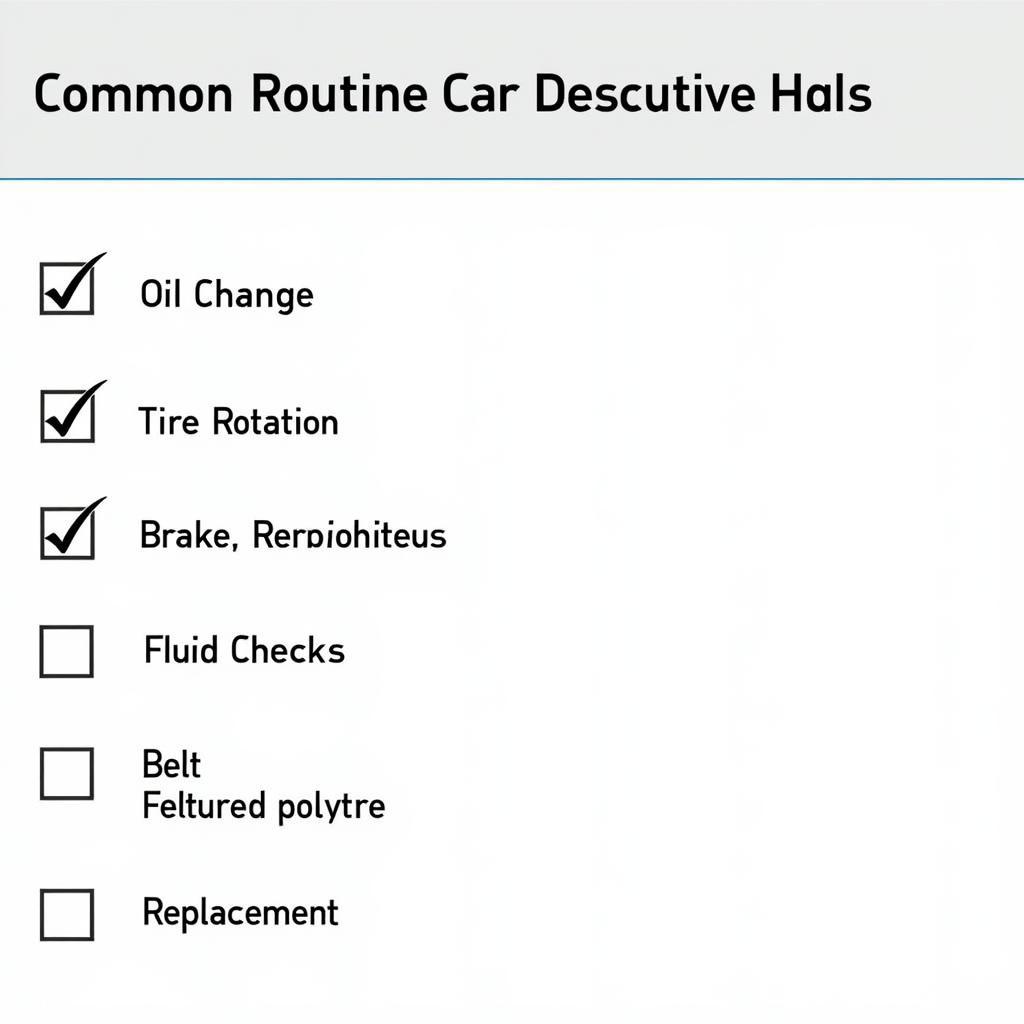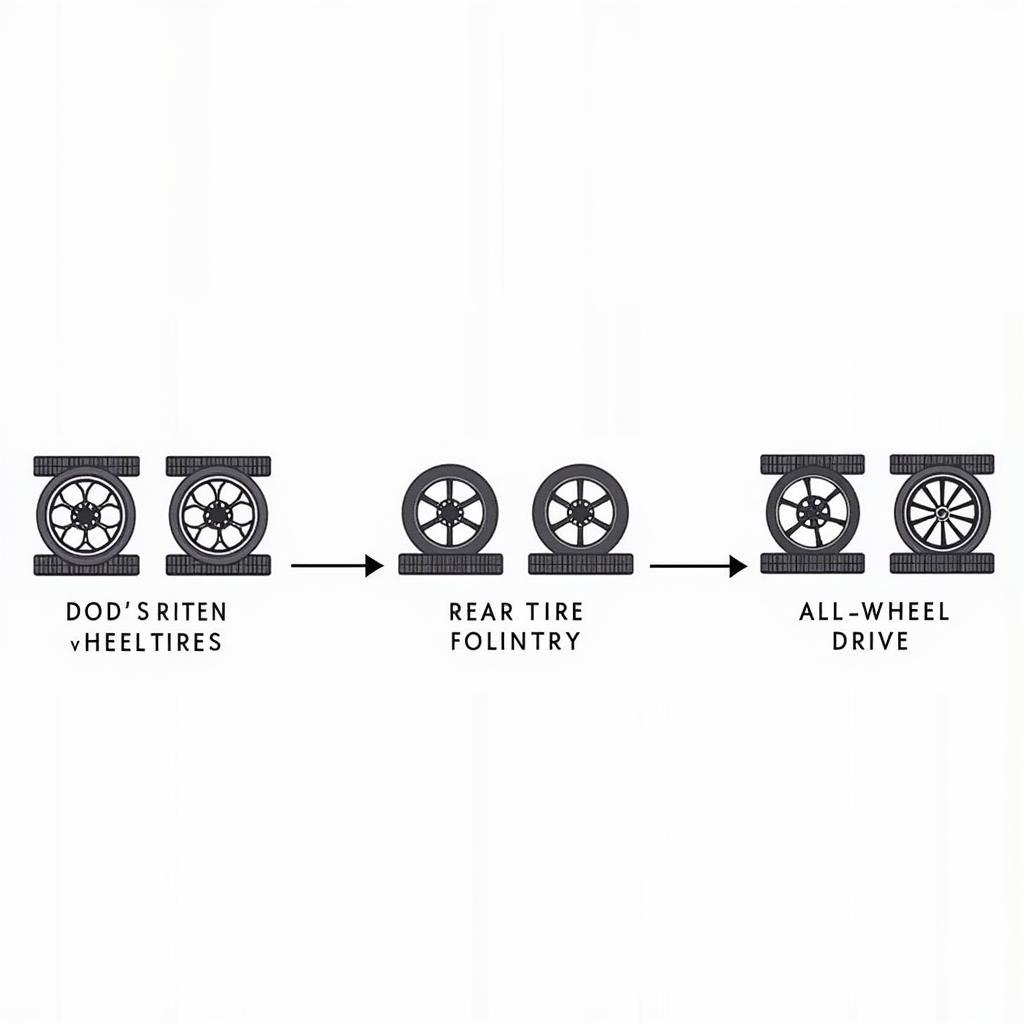As a car owner, you’ve probably heard the term “routine maintenance” thrown around quite a bit. But what does it actually mean, and why is it so important for your car’s well-being? Simply put, routine maintenance is the regular care you give your car to keep it running smoothly and prevent costly repairs down the road. Think of it like going to the doctor for checkups—it’s always better to catch small issues early on before they turn into major problems.
 Car Maintenance Checklist
Car Maintenance Checklist
Why is Routine Car Maintenance Important?
Imagine this: you’re driving down the highway when suddenly, your engine starts sputtering, and smoke billows from under the hood. Not a great situation, right? Regular car maintenance can significantly decrease the chances of unexpected breakdowns like this. Here’s why it’s crucial:
- Safety First: Routine maintenance ensures all your car’s safety features are in top condition, from your brakes and tires to your lights and wipers. This keeps you and your passengers safe on the road.
- Longer Lifespan: Regular checkups help identify minor issues before they escalate, extending your car’s lifespan and saving you money in the long run.
- Better Fuel Efficiency: A well-maintained car runs more efficiently, saving you money on gas.
- Higher Resale Value: When it’s time to sell or trade in your car, a well-documented maintenance history can significantly increase its value.
toyota camrry 2017 leased car maintenance warning
The Essential Routine Car Maintenance Checklist
Now that you understand the “why,” let’s dive into the “what.” Here’s a breakdown of the essential routine maintenance tasks every car owner should be familiar with:
1. Oil and Filter Changes: The Lifeblood of Your Engine
Oil is the lifeblood of your engine, lubricating moving parts and preventing excessive wear and tear. Regular oil and filter changes are absolutely crucial for your engine’s health. Most mechanics recommend an oil change every 3,000 miles or 3 months, whichever comes first. However, always refer to your car’s owner’s manual for specific recommendations.
2. Tire Rotations and Pressure Checks: A Smooth and Safe Ride
Your tires endure a lot of stress, and uneven wear can lead to handling problems and safety hazards. Rotating your tires regularly (every 5,000-8,000 miles) ensures even wear and extends their lifespan. Additionally, checking your tire pressure monthly and inflating them to the recommended level (found in your owner’s manual or on the driver’s side doorjamb) ensures optimal performance and fuel efficiency.
 Tire Rotation Patterns
Tire Rotation Patterns
3. Brake Inspections and Pad Replacements: Stopping Power You Can Trust
Your brakes are your car’s most critical safety feature. Have them inspected at least once a year, or sooner if you notice any unusual noises or vibrations. Brake pads wear down over time and need to be replaced—your mechanic can advise you on the appropriate replacement schedule.
4. Fluid Level Checks: Keeping Everything Flowing
Your car relies on a variety of fluids to function correctly, including engine coolant, transmission fluid, brake fluid, and power steering fluid. Regularly checking and topping off these fluids ensures your car operates smoothly and prevents damage to vital components.
5. Belt and Hose Inspections: Connecting the Dots
Belts and hoses play a vital role in powering your engine’s accessories, like the alternator and power steering pump. Over time, they can crack, fray, or become loose. Regular inspections help identify potential issues before they lead to more significant problems.
6. Air Filter Replacement: Breathe Easy, Engine!
Your engine needs air to breathe, and a clean air filter ensures it gets a steady supply of clean air. A clogged air filter can restrict airflow, reducing performance and fuel efficiency. It’s a good idea to have your air filter replaced every 12,000 miles or as recommended by your mechanic.
[car maintenance and gas costs average](https://autotippro.com/car-maintenance-and-gas costs-average/)
7. Battery Check and Cleaning: A Jumpstart on Reliability
Your car battery provides the initial power to start your engine. Over time, battery terminals can corrode, hindering performance. Regularly checking your battery’s charge level and cleaning the terminals can help prevent unexpected starting problems.
“Remember,” says John Smith, a senior automotive engineer at a leading car manufacturer, “sticking to a regular maintenance schedule not only keeps your car running smoothly but also provides peace of mind knowing you’re doing everything you can to ensure a safe and reliable ride.”
Beyond the Basics: Additional Maintenance Considerations
While the tasks listed above cover the essentials of routine maintenance, there are a few additional things to keep in mind:
- Timing Belt/Chain: Consult your owner’s manual for the recommended replacement interval for your car’s timing belt or chain. This is a critical component, and a failure can lead to catastrophic engine damage.
- Spark Plugs: Spark plugs ignite the air-fuel mixture in your engine cylinders. Replacing worn-out spark plugs can improve performance and fuel efficiency.
- Transmission Fluid Flush: Your car’s transmission fluid should be flushed and replaced periodically as recommended by your manufacturer.
- Coolant Flush: Your car’s cooling system should be flushed and refilled with fresh coolant every few years.
Making Routine Maintenance a Habit
Keeping track of your car’s maintenance needs might seem overwhelming, but there are a few things you can do to make it more manageable:
- Consult Your Owner’s Manual: Your owner’s manual is your go-to guide for all your car’s maintenance needs. It outlines recommended service intervals and provides valuable information about your specific make and model.
- Keep a Maintenance Log: Maintain a logbook or use a smartphone app to keep track of all maintenance tasks, including dates, mileage, and costs.
- Find a Trusted Mechanic: Establish a relationship with a reliable mechanic you trust. A good mechanic can provide valuable advice and help you stay on top of your car’s maintenance needs.
electric car servicing & maintenance
Conclusion
Routine car maintenance is not an optional expense—it’s an investment in your safety, your wallet, and the longevity of your vehicle. By understanding the importance of regular checkups and adhering to a consistent maintenance schedule, you can enjoy a smoother, safer, and more enjoyable driving experience for years to come. If you need help creating a maintenance schedule or finding a qualified mechanic in your area, don’t hesitate to reach out to us at AutoTipPro. We’re here to help you keep your car in tip-top shape. You can call us at +1 (641) 206-8880 or visit our office at 500 N St Mary’s St, San Antonio, TX 78205, United States.
FAQ
1. How often should I get my oil changed?
It’s generally recommended to change your oil every 3,000 miles or 3 months, whichever comes first. However, refer to your owner’s manual for your car’s specific oil change interval.
2. What happens if I skip routine maintenance?
Skipping routine maintenance increases the risk of breakdowns, reduces your car’s lifespan, and can lead to costly repairs in the long run.
3. How can I find a reliable mechanic?
Ask for recommendations from friends, family, or online reviews. Look for a mechanic who is certified, experienced, and communicates clearly.
4. Can I do routine maintenance myself?
Some routine maintenance tasks, like checking fluid levels and tire pressure, can be done at home. However, it’s best to leave more complicated tasks to a qualified mechanic.
5. Why is my “check engine” light on?
A “check engine” light can indicate a wide range of issues, from minor to serious. It’s essential to have your car diagnosed by a mechanic to determine the cause and address the problem promptly.





Leave a Reply